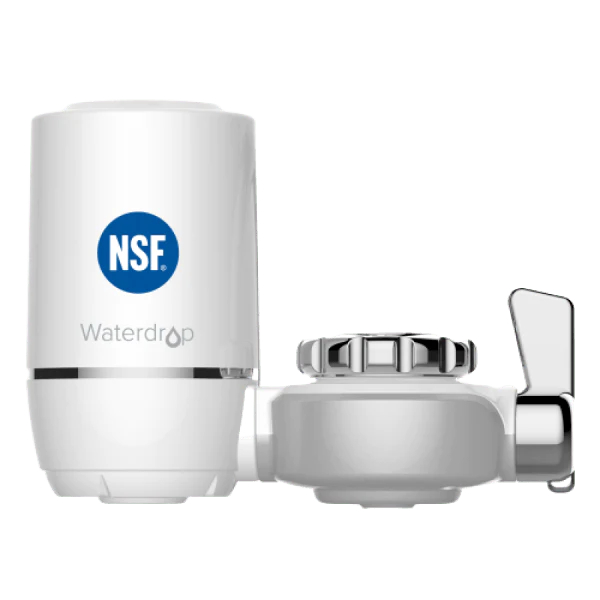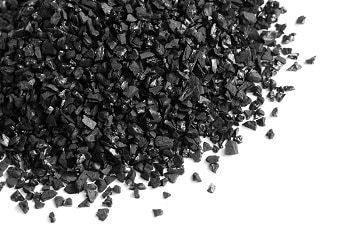UPDATED: July 23, 2022
You noticed an odd taste in your drinking water, so you decided to get a Brita water filtering pitcher to improve the flavor of your water. You were all excited to see how good your water will taste just to find out that it still tastes bad, why is that?
The carbon in a Brita water filter does not remove everything that can cause a bad taste in your water. It can help reduce some chemicals and particles in your water, but there are many other impurities and dissolved solids that can affect the taste of your water.
A Brita water filter uses carbon to reduce the number of chemicals and particles in the water that can give the water a bad taste. But there can be many reasons why your water may still taste bad, even after you have put it through a Brita water filter.

Tested and certified by NSF International against NSF/ANSI standard 42 for the reduction of 94.2% chlorine, taste, and odor, and NSF/ANSI 372 for lead-free material. You are ensured of a safe and reliable drinking experience at all times.
Did you follow the filter preparation instructions?
Watch this quick video on how to prepare a Brita filter.
A Brita filter cartridge is not like a coffee filter or a sediment filter as it does not simply use a piece of mesh fabric to capture impurities in the water.
Instead, a Brita filter’s primary water purifying material is simple carbon, or in other words, charcoal.

Carbon contains very small dimples and crevasses that are able to trap chemicals and other small particles that can alter the taste of drinking water. But when you first buy your Brita filter, these small holes are mostly full of air and carbon dust.
This is why it is very important that you thoroughly rinse a Brita water filter before installing it in any of Brita’s water dispensers.
If you don’t properly rinse a Brita filter, you may taste some carbon dust and it may take a few pitchers of water before the taste of carbon goes away.
Did you put in a filter that has been around for a while?
Although the carbon that is in a Brita water filter has a very long shelf life, if the filter is stored in a warm area or in a spot where it gets exposed to direct sunlight for a long period of time, the carbon can get very dry.
Just like the old saying that a dry sponge will not pick up any water, the very dry carbon inside of a Brita water filter will work better once it has been exposed to water for a while.
This is why Brita suggests that if a Brita water filter is more than 1 year old, it should be soaked in water for 15 minutes.
Even if the filter is in its original packaging, over time the air inside of the packaging can lose all moisture, and therefore the carbon will become completely dry.
When you open a filter that has been around for a while, take it out of its package, place it in a bowl of cool to warm water, and give it a little shake.
Shaking the filter underwater will help to remove any trapped air bubbles deep inside of the carbon.
After giving the filter a shake, let the filter soak in the water for a minimum of 15 minutes. Letting the filter soak longer than 15 minutes will not hurt or shorten the life of the filter, but there is no need to let it soak for more than a half-hour or so.
After you have soaked the filter, shake off the extra water and install the filter into your Brita water dispenser. Even though you have soaked the filter, you should still discard the first few pitchers of water to clean the filter of any leftover particles.
A Brita filter may not be able to remove what is making your water taste bad.
Not all filters are created equal! And a Brita water filter certainly will not remove all of the potential contaminants in your water that could cause it to have a bad taste like a reverse osmosis drinking water system would.
As per Brita’s website, a Brita water filter will help reduce levels of Chlorine, Lead, Mercury, Cadmium, Benzene, Asbestos, Particulates, Copper, Zinc, (1,2,4) Trichlorobenzene, (TTHMs, Giardia, Atrazine, Lindane, and Trichloroethylene (TCE)), and some other additional contaminants but there are many other impurities that can cause your water to taste bad.
Without a complete water test kit, you can not be sure if a Brita water filter will improve the taste of your water at all.
They work very well at reducing poor taste due to chlorine in municipal water supplies, but if you truly want your water to be purer, a reverse osmosis drinking water system will remove far more impurities than a Brita filter.
It may not be your incoming water that is causing the bad taste.
If you are finding that your water tastes different than it did before, a Brita filter may not be needed at all.
Check your water at the earliest point that it enters your home.
If you have a well with a pressure tank, you should be able to get a sample from there, or if you have a water sediment filter, you can get a sample from there.
Smell and taste the water to see if it tastes and smells the same as it does coming out of your kitchen faucet.
If you notice that your water tastes good before it goes through the plumbing of your home, you may have a build-up of bacteria or minerals in your plumbing that is causing the bad taste.
Installing a water softener can gradually clear the minerals in your plumbing, and running a quarter cup of household bleach through your plumbing can help to eliminate bacteria that may be in your plumbing.
What to do if your water tastes bad even with a Brita water filter.
If you have determined that your Brita filtered water still tastes bad after checking for other causes, and changing the filter still doesn’t seem to help, you may want to contact a local laboratory to have your water tested for contaminants or use a do-it-yourself water test kit.
A very reliable way to greatly reduce bad tastes in your water that a Brita water filter may not be able to remedy is to install a reverse osmosis system to reduce most impurities by up to 98 %.
Understand What’s In Your Water!
Easily check that your water is free of hard minerals!
Know if your water contains dissolved iron!
Check the Total Dissolved Solids in your water!
Get more facts about your water!


Hi my tap water taste fine but the Brita water (just got a filter/jug on a friend’s recommendation to encourage me to drink water), taste bitter. My kids first brought this to my attention. Is there a reason for this? I got the brita filter/jug from Robert Dyas on less than a week ago.
I am planning to return the products.
Hello Angela, and thank you for the question.
The bitter taste in your water is most likely due to high pH in your water or a high level of TDS (Total Dissolved Solids).
If you have municipal water, the Brita filter will be removing any Chlorine or other chemicals in your water that may have masked the bitter taste of the other minerals and dissolved solids in your water.
Water with a high pH can have a bitter taste, but you may have not tasted it before because of the other tastes in the water masking the bitterness.
Some medications can have a reaction with certain water situations that can make the water taste bitter. Drinking water that has been purified soon after taking some medications can often taste bitter.
Test your water pH to see if it is 8.0 or above. I find that at 8.0 is where people start to find a bitter taste in their water.
I hope this helps.
Paul